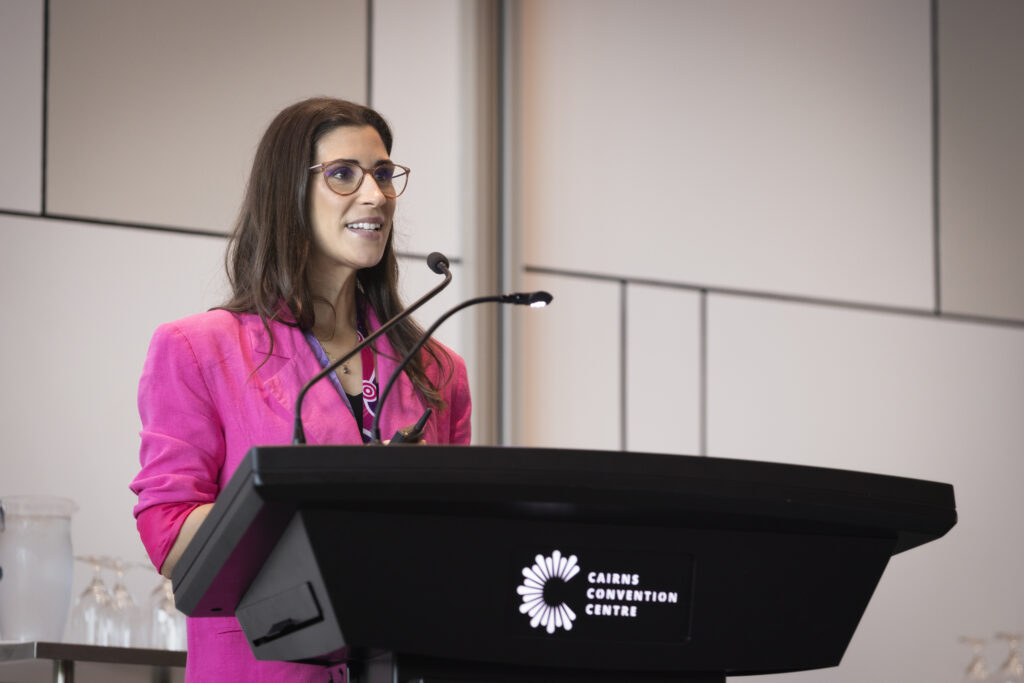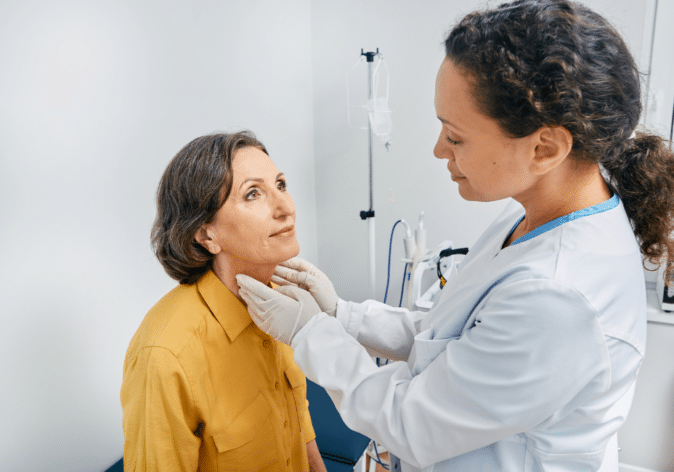Dr Anna Singleton is a Senior Research Fellow at the Daffodil Centre, a joint venture between the University of Sydney and Cancer Council NSW. Her research focuses on co-designing and implementing accessible and scalable digital health services to improve health outcomes for people living with and beyond cancer.
We spoke with her about the EMPOWER-SMS clinical trial and what it aims to achieve for breast cancer patients.
“Our EMPOWER-SMS clinical trial really aimed to improve women’s health and wellness after they’re finished their sort of initial treatment, surgery, chemotherapy, and radiation therapy.”
“What consumer representatives have told me is that they finish those treatments, they ring the bell, they’re so excited, and then they go home, and months go by, and they’re still not feeling quite like themselves, they sort of miss the support that they were getting from the community.”
“They Googled cancer online and what to do after cancer and all these different things came up, which was super overwhelming for them.”
“So, we thought, why don’t we create a program to help support you during that time and sort of point you in the right directions. So, EMPOWER-SMS is a co-designed health and wellness text message program. So, people get four text messages per week for six months about a range of different topics.”
“So, it could be related to the food that you should be eating, or how much exercise you should be getting, or how to manage some of those really tough side effects, like hot flushes and joint pain. There’s also links to helpful websites or free programs that you may or may not know about in the community. And the aim is really to link up the information that your doctors have already given you with freely available services that are offered in your community, and just really provide that individual support directly to your phone that you’re already using every day.”
Listen to the Podcast
We spoke to Dr Anna Singleton about improving endocrine therapy adherence through text messages.
What were the main findings of the trial?
“What we found was that receiving these messages helped people miss fewer doses of their endocrine therapy because they were able to better manage some of those really tough side effects and they knew who to talk to when they needed help.”
“There were quite a few messages about if you’re feeling this certain way or if you’re noticing these side effects, go speak to your doctor about it and ask them if it’s normal. See if there’s any options for you. Because they’ve given you this medication because it’s supposed to be helping you more than it’s hurting you. And if it’s hurting you a lot, then we need to look at some other options.”
“So, it was really that type of messaging. We also found that it slightly helped people improve their physical activity by about five minutes each day, which is really exciting. It doesn’t sound like much, but new research shows that even doing five extra minutes of physical activity every day can lower your risk of heart disease and lower your risk of cancer coming back.”
“It was cool that a little text message could sort of do all that. But I think more importantly than all of that, we got a lot of feedback from people about the messages, and 100 percent of them said it was easy to understand, and 91 percent said they were useful, and it helped them with managing their health and that was really, exciting.”
“Some of our participants said it felt like they had a secret friend who was supporting them, and nobody else had to know about it. One person even said, ‘it was nice that I could change my behavior, and nobody knew it was because of what was happening in a text message. It just looked like I was doing it on my own’.”
Was there someone on the other end or were these automated messages that got sent to them?
“In that trial, they were discouraged from texting back. Some people would, which was also totally fine. Since the trial, we’ve sent it out to over 850 people during the COVID-19 pandemic. And they were allowed to text back. And, they would just say things like ‘oh, thank you so much for the advice’.”
“If they did ask any medical questions, which was maybe 10 messages out of the hundreds and hundreds of messages we received, we would just instruct them to speak to their doctor about that particular issue.”
How do regular text messages contribute to improving medication adherence among breast cancer patients?
“So, I think it depends. These messages were really designed for people with a lived experience of breast cancer, with their doctors. So, I think it added this sort of extra layer of helpfulness and they were really based in science and the program wasn’t solely. medication. It was about your health and wellbeing as a whole.”
“So, I’ve seen quite a few papers that only do a message a day about adhering to your medication, and they often fail. And I do wonder if it’s because there’s too much focus on the one thing and the one message coming at the same time every day.”
“So, if you are looking for sort of daily reminders, I think that’s the place that you’d want to go, especially apps that have a bit of information or some videos. I did a study about the Medsafe app, which is good for people who take a lot of different medications because you can program them in.”
“It sort of looks like a pill box on the screen and you can tick off when you’ve taken it. So, then you have a list that sort of tracks if you took it today. I think there’s lots of ways that you can use tools that you have every day like your phone, or even a calendar and a check mark, that works too. It’s whatever works for you.”
“What sort of made this program special as well is it comes at random times during the day and on random days. So, it really feels like a friend or a family member is messaging you, which is a little different because if you’re really looking for something to support you in your medication adherence, they are really helpful as well.”
What are the potential challenges of reaching patients through text messages?
“So, there’s huge problems at the moment with spam text messages. People are very nervous to open text messages, and to click any links in text messages. So, I’m actually running a new trial where GP practices will be sending a text message inviting people to this program across Australia.”
“I’m making sure that that message really feels like it’s coming from that GP and it’s coming from the exact same number where they always get their appointment reminder message from is really important so that they can trust that it’s not some sort of spam thing trying to steal their money, which can be really difficult.”
“And not only for the patients as they may call the practice, and it may clog up the phone lines. So then other patients who need help can’t get it because the receptionists are busy dealing with this big problem. So, it has been very challenging recently trying to sort of navigate the space.”
What do you foresee as the next steps or future research directions and improving medication adherence for breast cancer patients?
“Yeah, so I’m launching a trial in general practice and so that one is focused on physical activity, but medication adherence is a secondary outcome that we’re looking at and seeing if it is helpful or not to have these messages about how to manage side effects or how to create little habits to remember to take your medication, especially when you’re starting out with the new medication.”
“You’ve just come out of the hospital. It’s a new habit you have to form. How can I make it easier based on science? I’ll be your nerd helping you in the background sending you messages about it. We’re also trying to understand how we can integrate this into services that already exist. So, Breast Cancer Network Australia has an incredible phone line where you can call and get advice and support and they can point you in the right direction, whatever you need.”
“So, we’re now in discussions about incorporating EMPOWER-SMS into those services. So that’s another option for people. Because what I think is important is that one size doesn’t fit all. So, some people like text messages, some people like apps, some people like websites. And so, just giving people the opportunity to choose for themselves how they’d like to receive the information is important.”
For women who are currently undergoing or about to start endocrine therapy, what advice would you give them?
“I can tell you what all the consumer representatives have told me. I had some amazing consumer representatives from Breast Cancer Network Australia, and the Westmead Breast Cancer Institute. And they were so funny telling me about their experiences and they were giving me tips about, you know, if you’re having a hot flush at night, lay a towel on your bed. And then if you have a hot flush, and you’re feeling sweaty, pull it off the bed, put another one on. So, it’s just about normalizing that these things are happening and there are ways to manage them.”
“One tip they said was, if you really like swimming, that’s a good idea because if you’re exercising and you have a hot flush, you’re already wet, so you’ll cool down right away. It was just beautiful to see how they could spin sort of an annoying situation into a lighthearted thing. And we are wanting to make sure to normalise that other people are going through this as well, and to reach out if they need support.”
“We also want people to know that they should tell their doctors if they need help, as they’ll have more tips for you. Some of the side effects can get better over time if you continue taking your medication, and making sure not to stop taking it without speaking to your doctor because that can be a big problem as well.”
“So just a few of those tips. I’m not an expert in endocrine therapy but I just can share the information that sort of the doctors and the consumer reps have told me about it.”
What are your hopes for the future of breast cancer research?
“In general, a cure for all the different types and the strains of breast cancer so that we don’t have to deal with this anymore. I mean, a vaccine would be amazing, the same way that they have done for cervical cancer. I just think they’ve revolutionized the way we think about it as a prevention versus a cure.”
“I think having support for people who sort of finish that initial active treatment phase and who are moving into sort of trying to navigate their life again, but also having to go through those yearly scans that are scary. I also want to see more support for people living with metastatic disease. I think people are living years and years and having happy big, long lives with metastatic breast cancer and there’s just not enough information and support for them.”
“I have an amazing colleague at the Daffodil Center named Dr Andrea Smith who is a person with lived experience with metastatic breast cancer who’s just done incredible work in the space, and for the for the first time her and her team have been able to have an accurate number for how many people with metastatic disease are living in Australia, which is just incredible because now they can accurately say this is the amount of people who need help and support.”
“So, across the board, I think there’s exciting things happening. I’m happy to be part of it and to uplift consumer voices, to understand what they need and how I can help facilitate it.”
Support Us
Help us to change lives through breast cancer clinical trials research



